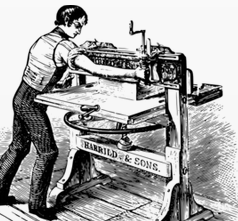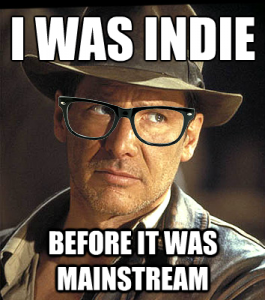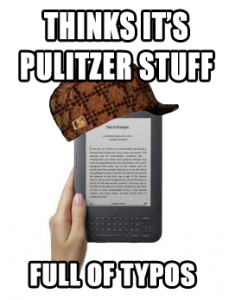My Indie Publishing Year In Review Distilled Into 5 Core Insights
 As the year 2011 is quickly draining away and being replaced with new plans, ideas and ambitions for the next, let's take a quick look back. But instead of just listing everything that we've done here (boring!), I'll give it to you in 5 tentative conclusions about the world of indie-publishing.
As the year 2011 is quickly draining away and being replaced with new plans, ideas and ambitions for the next, let's take a quick look back. But instead of just listing everything that we've done here (boring!), I'll give it to you in 5 tentative conclusions about the world of indie-publishing.
Note: The term indie does not have anything to do with Indiana Jones, Native Americans or Bollywood but is simply a short form for independent as in indie rock or indie games.

What is the difference between traditional publishing and indie-publishing?
Well, they got money, we ain't got none…
But, seriously… I would define it as follows:
"The indie publisher strives to provide the highest quality output based on the lowest quantity of physical or financial resources."
In other words, as an indie-publisher I have exactly one employee (me) who does everything that in traditional publishing would be handled by whole teams and departments:
I'm everything from my own worst boss, waking me up in the middle of the night to catch that deadline, to the disorganized cover-designer, over-worked tech-guy, bad-tempered pedantic editor and coffee cooking intern.
Why would anyone put up with all of this?
One word: freedom. You can do whatever you like.
This doesn't mean not being able to process criticism or get all snobbish when someone doesn't understand a sentence that – to you – was poetic genius but to most of your readers only comes off as syntactically garbled mess.

Freedom without responsibility is not real freedom. It's just recklesssness. But that's a different kind of discussion. So let's just leave it at that.
The indie publisher can choose what to write, how to write it, in what order to present the material, how to package it, and so on and so forth. Traditional publishers may have the benefit of out-sourcing or distributing the work among various professionals, but the indie-publisher can imbue his work with a strong character, spirit or attitude from the way the fonts look to the way the product is being marketed.
It is this wholeness injected by one individual's spirit that gives this feeling of authenticity, of not just another mass-produced thing off the shelf but something real.
The success of the indie game Minecraft (made by one person) is a good example of how convincing and captivating this spirit can be, compared to all the many corporately produced games that take millions to make and feel just like all the others.
But there are many other examples in the music world. Read this article about Sargent House for example.
OK, enough preparatory preachery. Here are my 5 insights of the year:
#1 Piracy Is Not A Problem: Inflexible Publishing Models AreIf you open any newspaper this day you'll find the reports of "ebook sales soaring" next to warnings of "intellectual property theft". But it's a misconception that piracy destroys writer's lives. Whether it's the music, movie or book industry, people have been copying stuff for decades. With each new technology, our abilities to copy stuff have soared but not less music, books or movies are produced. The opposite is the case: The lower the threshold to write and publish a book or record a music album, the more artworks are actually getting out there.
As publishers we have to ask ourselves: If stealing our stuff is more convenient for the reader than buying it, maybe we should do something about it? Maybe we should remove hurdles, reduce complicated sign-up procedures and just deliver the bacon?
And: If the payment process can not be streamlined, then maybe free is the best option.
#2 Free & Premium Is Not A ContradictionWe had a few free offers this year. And what I learned is this: Giving books away for free is the best possible thing you can do. If you absolutely have to, offer the books as a "bribe" for signing up to an email list but the best thing is to let people just download, no questions asked.
Interesting: Some works I put here on the site and simultaneously on Amazon for a low price. The result: The more people download something for free, the more will also buy it.
#3 From Zero To Hero: Publishing A Bestseller Is EasyBooks are not what they used to be. The role of publishing is changing. So is the meaning of a "bestseller". I found out this year that it's fairly easy to write a bestseller on Amazon. Why? Because a bestseller is relative to its category or target group, there is not only one bestseller list but hundreds!
#4 Collaboration Still RulesThe book "Education Is A Cow That Anyone Can Milk" was different from the beginning. Instead of just editing it on my own as usual and giving it to one or two friends to proof-read I made an open call on this blog to participate. Many people sent in their feedback and helped to improve the final result. It was so much fun that I'll definitely do it again. The book is available for free, by the way, or on Amazon for a reasonably small price.
#5 Blogging Is Not An Option, It's A MustI published a little guide about blogging this spring and I'm convinced now, more than ever, that blogging is an absolutely essential component of making this whole indie publishing thing work. It has many reasons, but the two most important ones are: developing reach and creating new contacts. In other words: The content of a blog is important but not as much as its context! Its power is indirect (people will find a blog for one reason and become interested in it for another) and asynchronous (people will stumble over older articles through search engines).
Having said that..
I wish you a Happy New Year!
About the author: André Klein has grown up and lived in many places including Germany, Thailand, Sweden and the Middle East. He has taught languages at private schools for many years, produced two music albums, performed at poetry slams, curated an experimental television program and is the author of How To Teach Online Without Selling Your Soul and various other publications.



